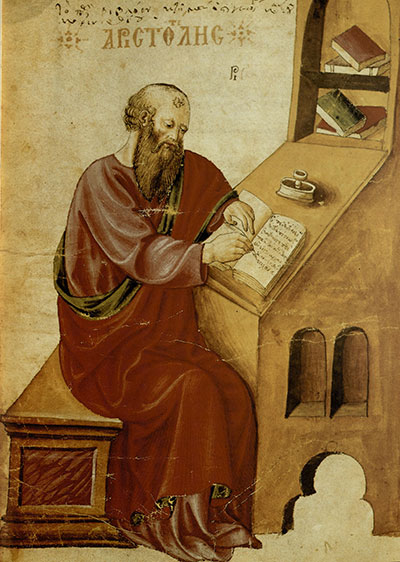

Aristotle at his writing-desk.
Miniature in the manuscript Vienna, Österreichische Nationalbibliothek, Cod. phil. gr. 64, fol. 8v. (1457). The book reads: Ἐπειδὴ τὸ εἰδέναι καὶ τὸ ἐπίστασθαι συμβαίνει περὶ πάσας τὰς μεθόδους, ὧν εἰσὶν ἀρχαὶ ἢ αἴτια ἢ στοιχεῖα — the beginning of the Physics.
Welcome to the website of our research project investigating how Aristotle writes. We are based within the Centre for Ancient and Medieval Philosophy and the Department of Classics and Ancient History at Durham University in the North-East of England.
Our work began on September 1st 2023 and will run for five years. Funding was originally awarded in 2022 under the European Research Council’s Advanced Grant scheme (for the full application forms please see links at the bottom of the page). But the 2021-2023 dispute between the UK and the EU over the Northern Ireland protocol necessitated that replacement funding be offered by the United Kingdom Research and Innovation’s Horizon Europe Frontier Research Guarantee Scheme, for which we are very grateful.
Our work will supplement analysis of Aristotle’s philosophical method with literary-critical, rhetorical and language-historical interpretive approaches, thereby transforming the understanding of Aristotle’s nature and status as a writer.
Aristotle was a pioneer in both philosophy and other disciplines such as natural science and literary criticism. Yet his own style and language have been overlooked, even though he stands chronologically between classical Attic prose and the Hellenistic koinē of most prose genres after the late 4th-c. BCE growth of the Greek world.
This project addresses his place in the history of literature and language, especially in relation to Homer, drama, rhetoric and Plato, writing a new chapter in the narrative of prose-writing that has excluded him. It scrutinises all his treatises largely regarded as authentic, plus the contested Athenaiōn Politeia, using methodologies including ‘traditional’ literary criticism, narratology, stylometric software and historical linguistics, allowing an unprecedented appreciation. in relationship to scientific method and communicative medium, of his illustrations, allusions, syntax, figures of speech, sentence type, paragraph and treatise structure, language and vocabulary.